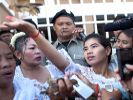Eye For Film >> Movies >> A Cambodian Spring (2017) Film Review
A Cambodian Spring
Reviewed by: Owen Van Spall

Chris Kelly’s A Cambodian Spring is actually the second film about Cambodia I have seen this week, Angelina Jolie’s drama First They Killed My Father - which focuses on the devastation caused by the dictatorial and genocidal Pol Pot regime in the mid to late Seventies - having come up in my Netflix queue earlier. A Cambodian Spring is, in contrast, an urgent documentary call to attention about Cambodia’s recent present - specifically 2008-2013 - and serves as a sad reminder that this nation remains troubled by a lack of law, order and justice even though the Pol Pot Khmer Rouge regime is gone.
Regular filmgoers should be well familiar by now with how ‘social activism’ documentaries operate in the digital era. Shaky smartphone and handheld digital camera footage of protests and crackdowns is interspersed with talking-head footage of those at the forefront of the clash between corporations and the impoverished, the military and the civilian, and governments and the governed. Kelly’s film does not do anything uniquely different in stylistic or formal terms, as it unfurls a portrait of three very different Cambodians. They are all united by the chaotic and often violent government-backed corporate land developments (and resulting protests) that we are shown as having literally drained the riverside village of Boeung Kak, Pnom Penh, into non-existence via a colossal man-made water diversion and demolition project. But Kelly does return again and again to a set of striking images that would not look out of place in a feature film: these include repeated use of crisp close-up shots of the waves of muddy water being shot out at incredibly high pressure from a drainage pipe, and a set of static long shots of the lake at magic hour that are both cinematically beautiful but also a chronological study of its worrying disappearance.

Kelly’s film covers a lot of ground, though maybe too much. The film’s starting point is the Boeung Kak protests that began in 2008 - where the poverty-line villagers desperately petition the World Bank to try to raise awareness of how their property and compensation rights are being violated while crudely-organised and violent house demolitions occur piecemeal. It then stitches together a narrative that sees this resistance to government-back corporate development merge over the next six years into a wider wave of national reaction against the ruling regime of Hun Sen, a former Khmer Rouge commander, in power since 1985. A canny operator, his administrations are shown to have been dogged for decades with widely-known accusations of corruption, land-theft and the assassinations of political opponents and activists.
By 2012, the Boeung Kak protesters are marching alongside garment factory protesters going on strike, and being courted by the main opposition leader returned from exile to challenge Sen. There is some arresting footage here of the many protests and crackdowns. But I found myself wishing the film had limited the focus down onto a narrower time period and given us more of the film’s incredibly compelling main POV characters; the Buddhist monk Venerable Luon Savath, and the female Boeung Kak protest leaders Tol Srey Pov and Tep Vanny. In particular, the eventual split between weary activist and mother Tol Srey Pov and the more media-savvy and worldly (she is shown meeting Hilary Clinton) Tep Vanny feels under-explored.
I also wanted to know more of the complexities of the charismatic and undeniably brave Venerable Savath’s position, him being both a monk and an activist (he is never without his robes and an impressively eclectic set of digital cameras) in a country where the head of his order appears to be a government appointee and stooge, and more socially conscious monks are forced to realise how fragile holy robes really are as protection against authoritarianism. Props to Kelly nevertheless for foregrounding the role of female protesters in this turbulent time in Cambodian history.
Reviewed on: 11 May 2018


















